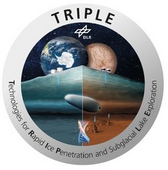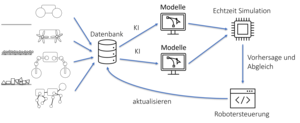
Research Departments
- Agents and Simulated Reality 2
- Cognitive Assistants 1
- Cooperative and Autonomous Systems 2
- Embedded Intelligence 1
- Innovative Factory Systems 1
- Interactive Machine Learning 1
- Neuro-mechanistic Modeling 1
- Robotics Innovation Center 12
Research Topics
- Autonomous Systems 13
- Data Management & Analysis 4
- Human-Machine Interaction 7
- IT Security 1
- Image Recognition & Understanding 5
- Machine Learning & Deep Learning
- Other 5
- Robotics
- Sensors & Networks 4
- Virtual & Augmented Reality 3
Fields of application
- Environment & Energy 5
- Farming & Agricultural Technology 3
- Financial Sector 1
- Health & Medicine 3
- Industrie 4.0 9
- Learning & Education 2
- Mobility 6
- Other
- Smart Home & Assisted Living 3
- Trade & Logistics 3
Search narrowed by:
Displaying results 1 to 10 of 18.
Research Departments
- Agents and Simulated Reality 2
- Cognitive Assistants 1
- Cooperative and Autonomous Systems 2
- Embedded Intelligence 1
- Innovative Factory Systems 1
- Interactive Machine Learning 1
- Neuro-mechanistic Modeling 1
- Robotics Innovation Center 12
Research Topics
- Autonomous Systems 13
- Data Management & Analysis 4
- Human-Machine Interaction 7
- IT Security 1
- Image Recognition & Understanding 5
- Machine Learning & Deep Learning
- Other 5
- Robotics
- Sensors & Networks 4
- Virtual & Augmented Reality 3
Fields of application
- Environment & Energy 5
- Farming & Agricultural Technology 3
- Financial Sector 1
- Health & Medicine 3
- Industrie 4.0 9
- Learning & Education 2
- Mobility 6
- Other
- Smart Home & Assisted Living 3
- Trade & Logistics 3




